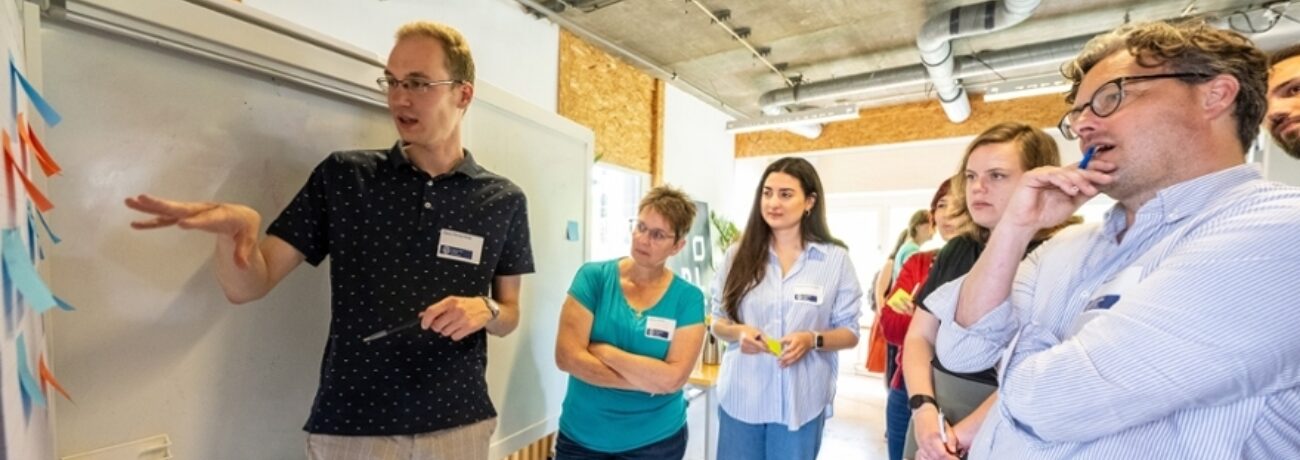Stronger together: the Leiden Research Support Network
The academic playing field is becoming more complex all the time, making a strong research support network crucial. Over 100 research support professionals shared knowledge, gained inspiration and became acquainted or got to know each other even better at the third Leiden Research Support Conference at PLNT.
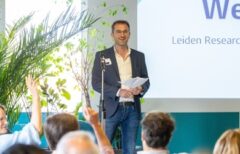
It is more important than ever for research support professionals to be in contact and share knowledge and experience, says LRS programme manager Dennis Janssen at the opening of the conference. Researchers work in an increasingly competitive world. Research budgets are limited and legislators, regulators and funders set strict and often complex requirements. ‘By working together, we can share the burden and don’t have to keep reinventing the wheel. Let’s learn from and inspire one another.’
The theme of the opening session is ‘Leiden Research Support Network: The Way Forward’. Because, says Janssen, although the Leiden Research Support programme is ending this year, the network will continue. The workshops focus on a number of challenges for the coming years, such as supporting Open Science and interdisciplinary research projects and grant applications. ‘Another important topic is recognising research support as a field, including developing the personal and professional skills this entails’, says Janssen. ‘I hope to find out more today about what you need for this.’
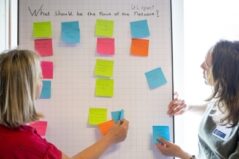
More visible
The research support professionals get to provide this input straight away. In groups and equipped with pens and Post-it notes, they visit flip charts with questions such as: What should the network look like in five years’ time? What challenges do you expect in the coming years? And: what are you satisfied with already?
There is no doubt about the answer to the latter question. ‘Stronger together’ adorns the paper in big orange capitals within minutes. Around it are brightly coloured Post-it notes filled with praise: The network facilitates connections; the other support professionals are helpful and knowledgeable; and there is always someone you can contact with questions.
At the same time, the network members can still see room for improvement. Their answers to the other question show that they want to see even more members and connections, and that lack of time is an issue for many of them. They also feel that the network should be more visible. ‘Lots of colleagues don’t even know the Leiden Research Support Network exists’, one member explains. ‘For new staff it differs per faculty how clear the information you receive about this is.’ And then there is the challenge of keeping the things that are already going well. ‘We are incredibly pleased with our community managers, for instance’, says one of the research support staff. ‘Leaders like these are desperately needed within such a network. So whatever happens: we need to keep them.’
To hear the latest news about the network and future events or sign up as a member contact the LRS at: lrs@bb.leidenuniv.nl.
What did participants take away from the conference?
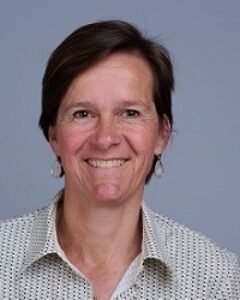
Anna Coyajee-van Rietschoten
Senior Grant Adviser
‘The good thing about the network is that new people are always joining but that it is also really worth staying the duration. Each new activity or event is of value because you realise you were ready for the next step. You also speak to people that you don’t usually meet in your everyday work. I really enjoy that.
‘A workshop I went to today was about interdisciplinary collaboration at the university. In groups, we were asked to think about low-hanging fruits: what small steps we can take to advance our interdisciplinary collaboration. One of our suggestions was to explore whether we can already foster interdisciplinary thinking in our PhD students and postdocs. And two other colleagues told me that they recently gave a presentation to the researchers at their research institute about the funding options for interdisciplinary collaboration. You often think: "Interesting, what would they have talked about? That would be good for other grant consultants to do as well." Since we work so hard at this conference on community building and sharing experiences, I dared to ask if they would be willing to share their slides and talk about them. The workshop was a great example of knowledge sharing.’
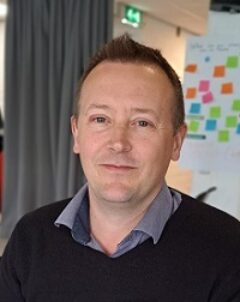
Jimmy Mans
Policy officer at the Faculty of Archaeology
‘It’s good there is so much knowledge in this network. Meeting other research support colleagues makes you realise that you’re not an island, even if it sometimes feels that way at a small faculty. But you don’t always have to go it alone, which is a nice idea. I’ve been in this job for under a year so I’m learning a lot by being here today – not just in terms of knowledge but also about who exactly I can contact for what, which is really useful.
‘One of the workshops I went to today was about research support and Open Science. The good thing was that we tackled it from a very practical angle, with clear cases and concrete questions about how we as support professionals would deal with these cases. You also saw straight away how big and varied the subject is: one case was about patents and drug research and the other about historical manuscripts and their transcriptions and translations. I think that as research support professionals we have a lot to offer our researchers in terms of Open Access and Open Science but that it also demands a lot of us. The rules and requirements are changing all the time. It’s almost a moving target, so you really have to understand how it all works.’
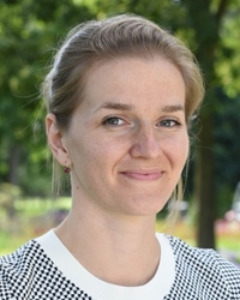
Tessa de Roo
Digital scholarship librarian
‘In my work I have lots of contact with researchers but less so with other research support colleagues outside my team. So I thought it would be a good idea to strengthen these ties here today. Luckily I’ve had lots of nice chats, so: mission successful!
‘It was interesting in the “Happiness at Work” workshop to think about how to increase my job satisfaction. Social skills are crucial for me. I have to be able to get along and talk with lots of people; it’s a really big part of my work. And I realised that predictability is important to me, as in knowing what is coming. It can be nice to begin with if every week is different, but at a certain point I want more routine and stability in my work.
‘As research support still isn’t properly recognised as its own field, you can sometimes feel a bit alone as a research support professional. It’s a huge help to find out through the research support network that others are dealing with the same things as you or to know that they can help if you can’t figure it out yourself. And the social side of the network is nice. You obviously go to work partly for practical reasons and to earn a living but it’s ultimately also because you are doing something fun with nice colleagues.’
For a slideshow of photos click here.

